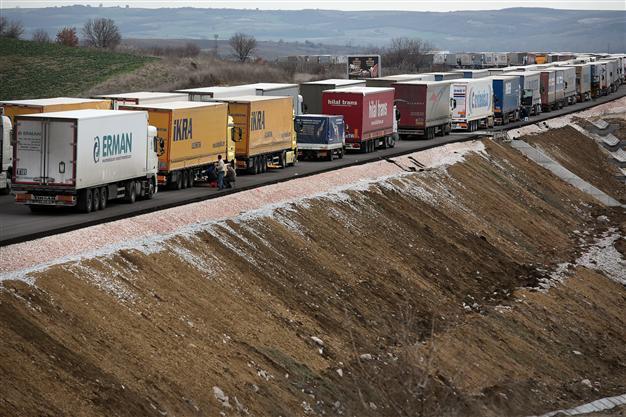Truck passage resumes at Bulgaria border gate
ANKARA/SOFIA

The truck queue at Bulgarian-Turkish border check-point Kapitan Andreevo reached 15 km on Jan 12. AP photo
A transit permit crisis that closed the border between Turkey and Bulgaria for almost two weeks has been resolved, after the latter approved 100,000 permits requested by Turkish truckers.Crossings at the Turkish-Bulgarian border began to return to normal at 9 a.m. on the morning of Feb. 13, Turkish Transportation Minister Lütfi Elvan said.
Speaking to Bulgarian National Radio (BNR), Bulgarian Deputy Prime Minister Daniela Bobeva said her government had agreed to deliver 100,000 permits.
She also said a ministerial level meeting between the parties would be held Feb. 17 in Istanbul.
Turkish Customs and Trade Minister Hayati Yazıcı took to Twitter to announce that parties are working on completing all checks at a single point to ease proceedings.
“We will undergo a study to speedily carry out all of the checks and processes at a single point at the Bulgaria-Turkey custom gates,” Yazıcı wrote.
The custom gates between the two neighbors had been shut for 13 days due to tension that was sparked when Bulgaria only gave 5,000 of the 125,000 transit pass permits it was expected to give Turkish truckers at the beginning of the year.
Turkey then closed its gates to Bulgarian trucks Jan. 31 in retaliation over the permit dispute. Sofia responded to Turkey’s move by also banning Turkish trucks from entering Bulgaria on Feb. 1.
A truck queue of over 10
kilometers has been waiting at the Kapitan Andreevo-Kapıkule border crossing for days, causing major problems for drivers who have been forced to wait.
New route search
Sector representatives have urged for a quick solution for the problem, citing risks to Turkey’s trade with European countries. Turkish transport sector players have drawn attention to the incident, saying it clearly indicates Turkey should gear up its efforts to diversify its export routes to Europe.
Although Turkish exporters immediately turned to alternative routes to transport goods to Europe, the absence of one of its major and cheapest transit options was expected to create huge losses.
After the Bulgaria route was closed, some of the goods had been transported through the İpsala customs gate between Turkey and Greece. However, the high volume at İpsala caused 16-kilometer-long queues to form at the gate, forcing transporters to consider tertiary options.
Therefore, transporters subsequently turned to seaborne solutions, using additional Ro-Ro routes from Istanbul to the Italian port of Trieste. The transporters and the government have also initiated talks with the Romanian and Greek authorities to create two new routes, including Ro-Ro journeys between Istanbul and the Romanian port of Costanza, and a road link between Istanbul and
Thessaloniki, before the goods are loaded onto Ro-Ro ships to be transported to Trieste.
















